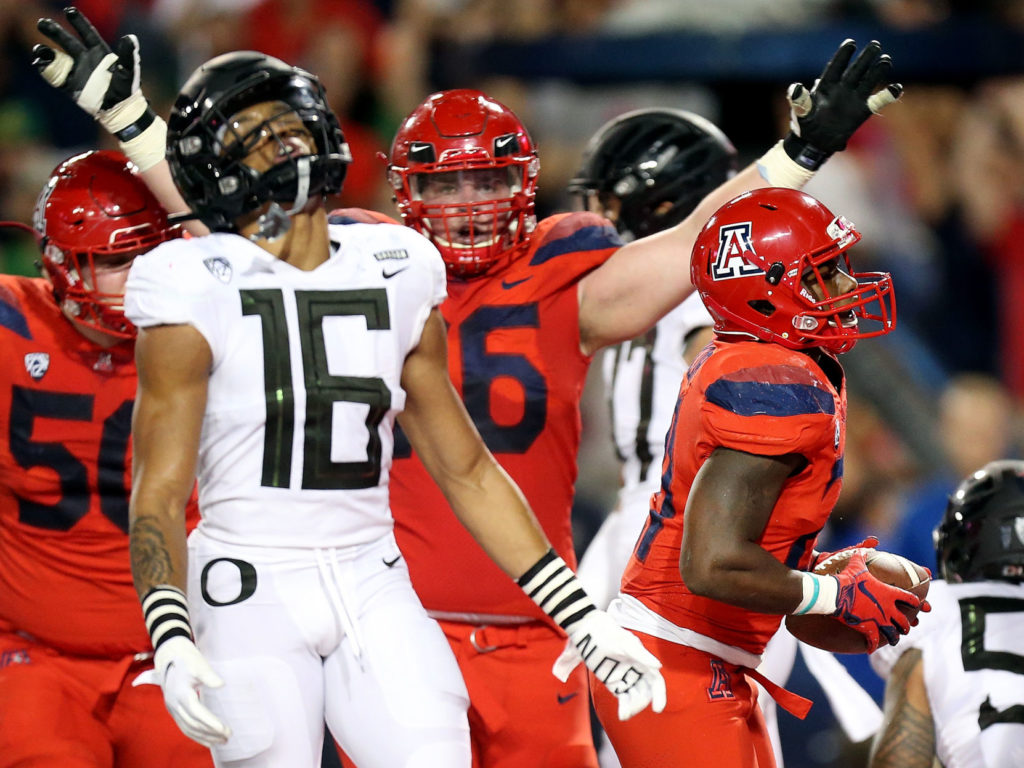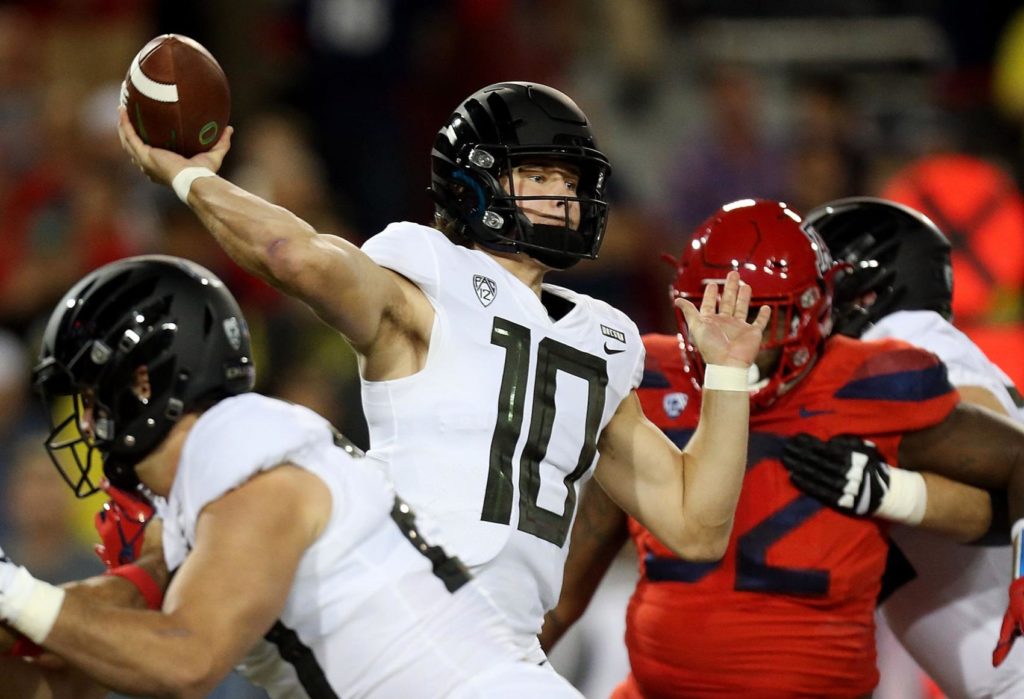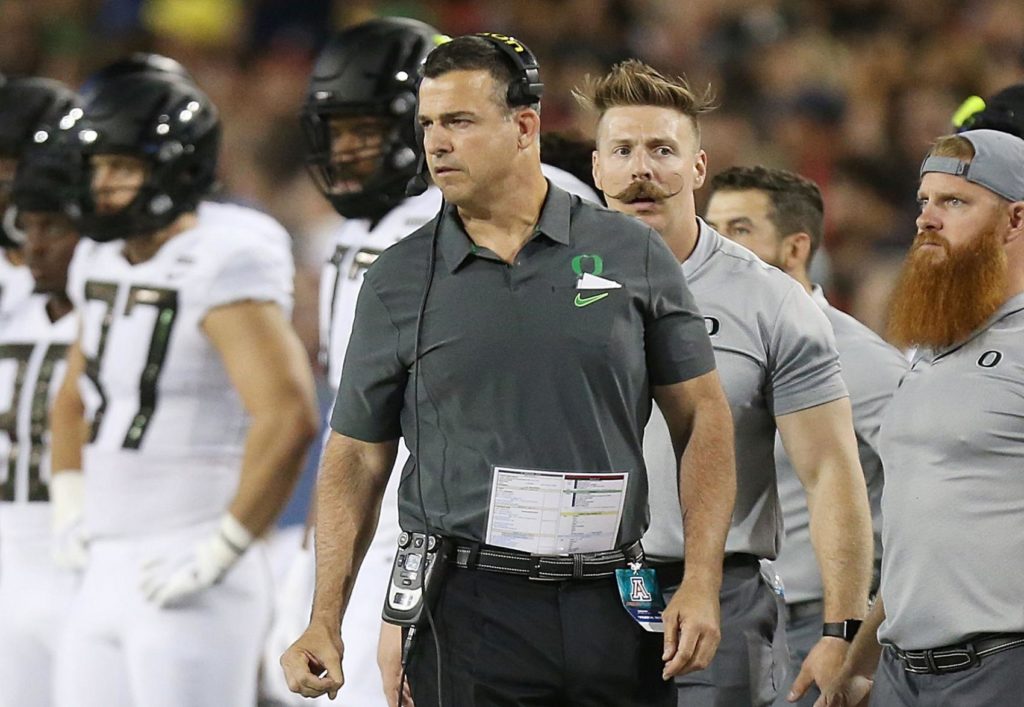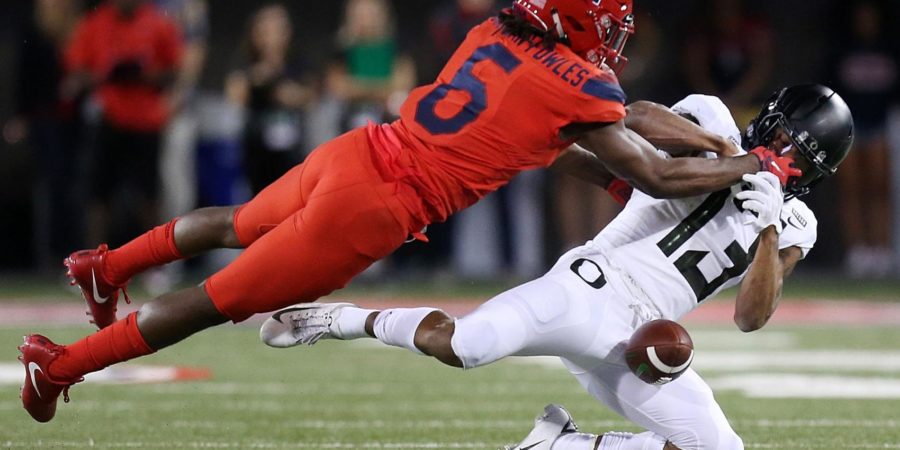Raise your hand if you were expecting Saturday’s result in Tucson!
Certainly there were things to be concerned about following Oregon’s uneven performance at Washington State last week, but beyond a few select diehards in the Tucson area, it’s hard to imagine anyone soberly envisioning the events that transpired inside Arizona Stadium Saturday night.
In their second of back-to-back road games, the Ducks were pantsed once again in front of a national television audience, as the previously 3-5 Arizona Wildcats dominated 19th-ranked Oregon, 44-15. The loss not only effectively eliminates Oregon from the Pac-12 title race, but it also fully revealed a litany of glaring issues surrounding this team as they search for answers over their next four games.
Below, WFOD examines the major takeaways stemming from what currently serves as the most embarrassing performance of the Mario Cristobal era to date.

1. Let’s face it, Oregon may just be a mediocre team in a mediocre conference
This is the point in the five stages of grief where Duck fans exercise acceptance of the fact that Oregon may simply be a mediocre team in a mediocre conference. It’s a bitter conclusion to arrive at, particularly coming off the high from the win over Washington two weeks ago, but it’s one that fans should begin grappling with as it relates to this year’s team. Sure, Oregon cruised through a non-conference schedule that provided very little in the way of serious competition. However, even those games, the Ducks showed undeniable glimpses of a team with real issues. In those three games, drops, the lack of a dominant running game, and incomplete four-quarter performances were noteworthy things, but were largely swept under the rug as the Ducks were hardly threatened in those contests.
With the start of Pac-12 play, Oregon seemed to elevate its game. Against Stanford, the Ducks performed as the far superior team for the three full quarters before a monumental fourth quarter collapse saw them fall to the Cardinal in overtime. Oregon rebounded nicely on the road versus Cal the following week, but a shaky second half left the door open ever so slightly for the Golden Bears, cementing questions around this team’s ability to adequately finish games. Coming off a bye two weeks later versus Washington, the Ducks earned their biggest win in four years. Yet, an honest look back reveals that Oregon could have just as easily fell to the Huskies if not for an errant field goal attempt and a gutsy play call by Cristobal that sealed the overtime victory. The emotional outpouring after that game left many wondering whether the hangover would linger the following weekend with a trip to Washington State on deck. It turns out those concerns were valid, as the Ducks choked and spasmed their way through a dismal first half before mounting a spirited second half comeback that ultimately fell short.
Despite more and more flaws rising to the surface, Oregon had to feel good about their chances of remaining in the hunt for the Pac-12 North division title entering this weekend, as Stanford, Washington State, and Washington were each slated to play one another between now and the end of the season. And with preseason favorites Stanford and Washington each falling on Saturday, the door was open for the Ducks to take advantage. They didn’t, as Oregon posted what was undeniably their worst performance of the season against one of the Pac-12’s worst teams in Arizona. The Pac-12, as a whole, has been a disappointment this season, as its best teams have failed to live up to their billing. It’s clear now that it’s time to accept that this Oregon squad is just another one of the many deeply-flawed teams the Pac-12 has to offer.
2. Oregon’s offense has become predictable, unimaginative, and stagnant
Coming into the season, everyone knew that, beyond Justin Herbert and the Ducks’ deep and talented offensive line, there were legitimate concerns about this team on offense. At running back, Oregon was replacing the school’s all-time leading rusher, while at wide receiver, the Ducks were searching for difference makers that could help add an explosive element to an offense featuring rising star at quarterback. Through the first six games, credit goes to the Oregon coaching staff for largely masking those deficiencies, as the Ducks – for the most part – excelled situationally, despite not quite having the dynamic big play ability of years past. However, if there’s anything to be gleaned from the past two weeks, it’s that that game is up.
For a second consecutive week, the Ducks posted a putrid overall offensive performance. Yet, unlike last week’s loss to Washington State, the Ducks never mounted anything resembling comeback against Arizona on Saturday. Despite facing the Pac-12’s second-worst defense in terms of total defense, Oregon was stymied both on the ground and through the air, managing just 270 yards on 71 plays. Similar to Washington State, the play calling was unimaginative and predictable, as the Ducks rarely pieced together drives that moved the chains and threatened the Arizona defense. In fact, Oregon converted only three third downs on 16 attempts, and was just 1-of-2 in the red zone.
As bad as that was, perhaps the greater concern is the staggering lack of development that has taken place at the skilled positions. We touched on this last week, but beyond Dillon Mitchell, and at times CJ Verdell, Herbert has been without much help offensively. Depth has been slow developing at running back, while there’s been virtually no development that has taken place at wide receiver. Losses are bad enough as is, but to see them come as a result of stagnant progress is a troubling trend.

3. Justin Herbert has frustrating bouts of tunnel vision
As bad as Oregon’s offense has been the past couple of weeks, one of the more concerning developments has been Herbert’s reluctance to target other receivers not named Dillon Mitchell. On one hand, it’s difficult to fault Herbert, who has been charged with carrying what is arguably the worst collection of skill talent that the Ducks have had in decades. On the other, there have been plenty of instances this season in which Herbert has missed open receivers simply because he was locked on a target (usually Mitchell) and failed to make his way through his progressions. That was proved out Saturday, as more than half of Herbert’s targets went to Mitchell before the junior wide receiver left the game late with an undisclosed injury. As talented as Herbert is, this is an area of concern with regard to his development as a passer, and one he’ll need to improve upon whenever he determines he’s ready to take his game to the next level.
4. The Ducks lack a reliable rushing attack
Going into last week’s game at Washington State, many believed that one of Oregon’s greatest strengths on offense was its newfound physical approach to the running game. Prior to the loss to Cougars, Oregon running back CJ Verdell had rushed for over 100 yards in four of the previous five games. Since then, however, he’s rushed for a total of 69 yards in the last two contests, as the Ducks as a team have rushed for only 71 yards per game (3.02 yards per carry) over that same span. Part of that has had to do with opponents jumping out to early and commanding leads, and part has had to do with an injury to true freshman sensation Penei Sewell, who’s absence due to an ankle injury suffered versus Washington has had a greater impact on Oregon’s offensive line than previously imagined. Still, the Ducks didn’t exactly possess an explosive ground attack with Sewell in the starting lineup, averaging 4.52 yards per carry over the first six games. With teams seemingly figuring out just how limited the Ducks are offensively with each passing week, the physical identity that Oregon had aimed to establish under Cristobal is slowly but surely eroding.

5. Forget 9-3, Oregon may be fortunate to make to 7-5
Oregon’s final five-game stretch beginning this past Saturday was viewed as a relatively cushy finish considering the four previous games that had been played against ranked opponents. The thought was that Oregon could use this fortunate break in the schedule to rack up some wins while carnage unfolded with the teams ahead of them in the Pac-12 North standings. That notion feels like a pipe dream now after Saturday’s drubbing at the hands of the Wildcats. With an offense that’s been inept and a defense that has been bitten hard by the injury big of late, Oregon’s remaining schedule suddenly looks like a potential mine field. Next week’s game versus UCLA in Chip Kelly’s return to Autzen Stadium will be emotionally charged and potentially dangerous considering the way the Bruins have performed in recent weeks. The same can be said for the season finale on the road at Oregon State, as the Beavers just notched an impressive victory on the road at Colorado. In between those two games is a road contest at Utah, which is currently playing like the best team in the Pac-12, and a home tilt versus Arizona State, which has been very competitive in Year 1 under head coach Herm Edwards and who is coming off a thrilling win on the road at USC. With the way they’ve played of late, if the Ducks can scratch out eight or nine wins, it would have to be considered a mild surprise.

